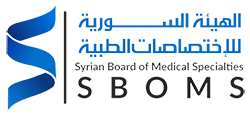With divine grace and the joint efforts of the Syrian Board of Medical Specializations (SBOMS), the Arab Institute for Sustainable Development (AICPD) an accredited institution by the Arab Medical Union, and the support of King’s College London, a cohort of Syrian medical educators, who are committed to improving the quality of medical services and enhancing the level of medical education in Syria, has achieved the Professional Diploma in Medical Education.
The Syrian Board of Medical Specializations (SBOMS) Board of Directors has endeavored to improve medical training in northern Syria by enhancing the efficiency of the trainers involved in the training process. The Arab Institute for Sustainable Development (AICPD) proved to be an effective partner for the SBOMS in providing a year-long training program that met the Board’s requirements. Dr. Abdelkarim Eqziz played a vital role in securing support from King’s College London to launch and complete this program. The diploma program’s success was a result of the hard work, patience, and desire for development shown by the participating trainees. Moreover, the dedication and sincerity of the lecturers at the Arab Institute for Sustainable Development were commendable. The culmination of all these efforts led to the launch of the diploma program, which will undoubtedly help improve the quality of medical training in northern Syria.

The diploma was necessary due to the high number of displaced people and the migration of numerous doctors and health workers. It has been designed to keep up with the rapid developments in the medical field over the last two decades. 24 doctors completed the training successfully, working hard to fulfill their duties within hospitals and various training centers to provide medical services and education. This experience was unique due to the current conditions in northern Syria, which included:
- Flipped learning is an innovative approach to education that has proven to be particularly effective in adult education. It involves changing the traditional order of items in lectures by asking trainees to study educational materials such as video lectures or readings independently before attending the actual lecture. During the lecture, interactive activities are conducted to encourage engagement with the teacher and colleagues, which promotes active participation and interaction among trainees in the learning process. This method leads to a better understanding and comprehension of the subjects being taught.
- The training program utilized a blend of Arabic and English, where Arabic is commonly taught in Syria, and English is the primary language of instruction in most Arab countries and accredited institutes. This amalgamation proved to be an effective approach, enabling Syrian doctors to access information with ease. The supervisors and teachers from Egypt highly appreciated this method, and they agreed to develop curricula for the subsequent stages to achieve the same goal.
- Doctors from various specialties and regions in northern Syria participated in a training program to enhance medical service quality. The collective dedication and passion of doctors enriched the program, fostered interaction, and motivated professors to put in greater effort.
This experience has contributed to several aspects, including:
- It supported Syrian doctors working in medical and health education in northwest Syria, who face difficult conditions due to the war.
- Career development is crucial for medical educators. A Professional Diploma can improve medical education in Syria. Syrian and Egyptian doctors exchanging experiences have been highly beneficial.
- Media aspect: it highlighted the efforts of Syrian doctors in the field of medical education, stressing that Syria has qualified medical staff and works to provide distinguished medical services. This pioneering and enriching step was a catalyst for further similar steps in developing competencies and capabilities in the medical field.
The following are the key objectives for supporting training programs in medical education for Syrian doctors, both in local and international settings:
- Provide additional support – Offer further assistance to the medical education training programs targeted towards Syrian doctors.
- Promote cooperation and knowledge exchange – Encourage collaboration and knowledge sharing between Arab doctors and doctors from other parts of the world, specifically in the field of medical education.
- Update medical education programs – Ensure that medical education programs in Syria are updated and aligned with the requirements and standards of the modern era. The Medical Education Diploma Program provided a great example for doctors from outside Syria to follow in terms of cooperation and exchange of experiences.
We hope that these positive experiences will be repeated in the future to further strengthen Arab cooperation and external cooperation and promote the development of medical education around the world.

